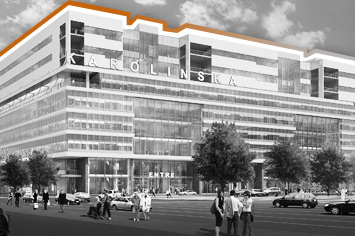
The world’s biggest PPP hospital – a logistical challenge for Coor
In May, it was announced that Coor would be responsible for co-ordinating and developing workplace and property services for NKS, the new University Hospital in Solna, near Stockholm, until 2040. The engagement has a record term but is fully possible because of Coor’s participation in the hospital’s planning and project management. Coor will now be applying its years of experience and know-how to the biggest logistical challenge in the company’s history.
Once the hospital is complete, it will treat nearly 2,000 patients a day, administer 600 beds and 180 consulting rooms. The workplace will also serve 6,000 employees and some 1,000 researchers and students. The hospital will be providing care in day and night shifts, operating 24/7. Everything to be delivered and removed from the hospital, like food, laundry, consumables and waste, is additional. This sets high standards for the services necessary to make the hospital work.
 "We quickly understood that the heart of NKS is its logistics. If this doesn't work, it doesn't matter how state-of-the-art the building is," commented Magnus Wikström, Coor's Account Manager for the NKS contract.
"We quickly understood that the heart of NKS is its logistics. If this doesn't work, it doesn't matter how state-of-the-art the building is," commented Magnus Wikström, Coor's Account Manager for the NKS contract.
One big advantage for Coor was it participating right through the planning and project management phase. This enables it to work alongside Skanska and analyse life-cycle costs for the hospital to get the lowest cost possible right through the period. This is about materials choices, planning flows and logistics or intelligent system solutions. The driver has been to think intelligently from the start—for builders and managers. The Stockholm health authority won't be paying for unavailable areas, and with total floor-space of 320,000 m², it's important to think clearly right from the start.
"We think about logistics at Coor and have enormous experience of administrative and FM services. This is the perspective we bring to the project. There should be as little manual processing as possible of every logistical item. This enables us to cut manual work input. For example, we don't transport items between goods wagons and storage shelves, but rather, the goods wagons themselves become the storage site," adds Magnus.
This long perspective also means that Coor can make investments that wouldn't have been justifiable on shorter-term contracts, where the uncertainty is too great. Magnus is convinced that over time, administrative and FM services get more efficient by building contractors and FM suppliers partnering through the hospital's development.
"The PPP setup means that over time, delivery will get cheaper and better, which is good for NKS and for the taxpayer."
Coor's assignment can be divided into four segments:
- Property services — like the maintenance of buildings, electricity, water and heating supplies.
- FM services — such as reception, cleaning, helicopter pad maintenance, security and conference services.
- Logistics services — all external and internal logistics, such as the handling of textiles, mail and freight, waste management (including a vacuum system that collects waste to the sorting station), patient food, hazardous waste and sterile products. The hospital will include an indoor goods reception, capable of receiving 24 m freight trucks. All transportation will be below the hospital floor in culverts, and mostly using AGVs, i.e. unmanned vehicles pulling goods wagons.
- Commercial services – responsibility for leasing to commercial bodies such as restaurants, pharmacies, kiosks etc., in the public part of the lobby.
To manage its undertaking, Coor will utilise three hubs, where the resources necessary to streamline its work are collected. The technology building, housing all media supplies, goods reception and the waste centre, is the first and largest hub. The logistics, mail and freight management point is the second hub. This is also the hub for all AGVs, which process a lot of the physical logistics in the building. For example, 10,000 floor-mops will be collected, laundered and delivered to 8,000 rooms daily. The third hub is the reception and service centre for staff and visitors, which also houses Coor's FM management.
"We've got to locate our managers where things happen so that they can deal with events and stay in control. We can't participate and deal with situations until we're hearing and seeing everything. We'll also be locating staff from the project management company here because we've got to work closely with each other and with our partners," adds Magnus.
Magnus thinks that PPPs make an attractive project structure, especially because they offer Coor good prospects of being able to plan and execute service delivery so it suits NKS optimally—for the long term.
"We've got a lot of contracts running for long periods, which is nothing new to us. But most often, we move into a completed building, or take on an ongoing operation with existing staff. It's unusual for us to be there during the project management, building and the creation of new services. It's going to be really exciting to follow our progress and that of NKS," concludes Magnus.
